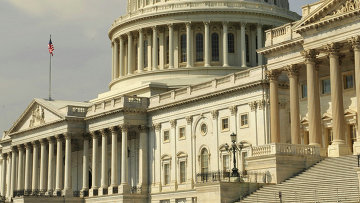WASHINGTON/MOSCOW, July 25 (RIA Novosti) - A legislation aimed at substantially curbing the federal government’s ability to collect information about Americans’ phone calls failed to pass the US House of Representatives on Wednesday, Washington Post reported.
The amendment to a nearly $600 billion defense bill envisaged restrictions on how the US National Security Agency (NSA) collects data on the phone records of US citizens and was proposed in the wake of fugitive former intelligence contractor Edward Snowden’s disclosure of secret government surveillance programs last month.
According to Washington Post, lawmakers voted on Wednesday 217 to 205 to defeat the legislative initiative that the White House earlier urged lawmakers to reject.
“We oppose the current effort in the House to hastily dismantle one of our intelligence community’s counterterrorism tools,” White House spokesman Jay Carney said in a statement Tuesday. “This blunt approach is not the product of an informed, open, or deliberative process.”
The amendment was introduced by Rep. Justin Amash, a conservative Republican from Michigan who has found bipartisan support for the measure in the House of Representatives.
A top-secret document leaked by Snowden to the British newspaper The Guardian last month showed that the US Foreign Intelligence Surveillance Court, a secretive body known as the FISA court that authorizes such surveillance, had ordered US telephone carrier Verizon to provide the NSA with daily information about calls made by the company’s customers.
The revelation and subsequent leaks by Snowden about US intelligence gathering operations set off an international furor that saw the former CIA employee go into hiding as US authorities issued a warrant for his arrest on charges of leaking state secrets.
Snowden arrived in Russia on a flight to Moscow from Hong Kong on June 23. The United States has revoked his passport, and he has reportedly been holed up in the transit area of Moscow’s Sheremetyevo airport while trying to secure temporary asylum from Moscow.



